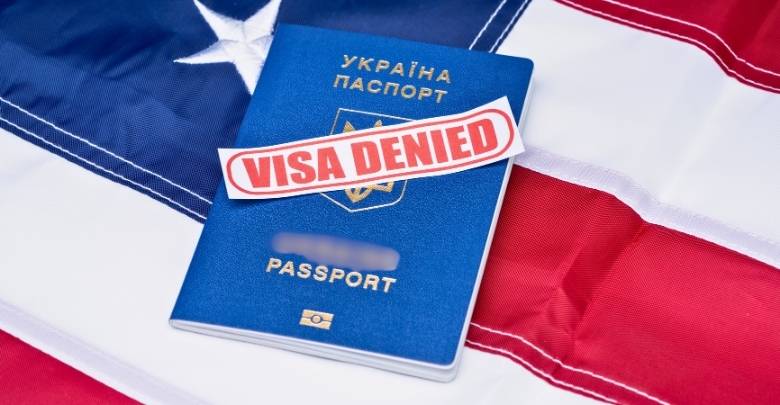When applying for a visa to the USA, providing complete and accurate information is crucial to ensuring a smooth approval process. If you’ve previously been denied a visa for attending a conference, it’s wise to disclose that refusal in your new application. Now, you might be wondering: What happens if I forgot to mention previous conference visa refusal USA?
If you forgot to mention a previous conference visa refusal for the USA, it could be considered misrepresentation, leading to serious consequences such as visa denial, legal repercussions, loss of application fees, processing delays, and damage to your credibility. These issues may also affect your family members’ eligibility for visas in the future.
To better analyze the consequences of this situation and learn how to address it, follow the rest of the article for expert advice and actionable steps to manage this challenging scenario effectively.
What Happens If I Forgot to Mention Previous Conference Visa Refusal USA?
When applying for a visa, you must provide accurate and honest information. Mistakes or missing information can lead to serious issues later. If you are planning to attend a conference in USA, you should be transparent about past refusals. Here is what happens if you fail to mention a previous refusal of a visa:

Misrepresentation Issues
Failing to mention a previous visa refusal may be viewed as misrepresentation. Immigration officers could interpret this as intentional deception. Such missteps can result in severe consequences, including visa denial. The omission may also raise red flags for future applications.
Damage to Your Credibility
Credibility is vital during visa applications, and honesty plays a key role. Forgetting to disclose prior refusals can severely damage your reputation. Immigration authorities expect applicants to provide accurate and complete information. Your application may be scrutinized more intensely as a result.
Risk of Application Denial
Not mentioning a previous conference visa refusal can lead to outright rejection. The consular officer may find this omission as grounds for denial. The officer may also question your overall trustworthiness. This could jeopardize your chance of approval, even for future applications.
Legal Repercussions
Legal consequences may arise from omitting information about a visa refusal. Misrepresentation is a serious offense under immigration law. In some cases, it can lead to bans on reapplying for visas. This restriction can last for a significant period, affecting your travel plans.
Financial Consequences
Lack of disclosure can result in the loss of your application fees. These fees are non-refundable, regardless of your application’s outcome. Financial losses add to the burden when your visa is denied. You will need to reapply and pay the fees again, causing more expenses.
Delayed Processing
Visa applications could face delays when an omission is discovered. The consular officer may need additional time to investigate the issue. These delays may push your travel plans back significantly. Processing times could stretch for weeks or months, depending on the situation.
Impact on Future Applications
A refusal due to misrepresentation can affect future visa applications. Future applications may be scrutinized more closely, making approval harder. Previous refusals and misrepresentations are recorded in your immigration history. A clean record is important for securing visas in the future.
Consequences for Family Members
If you have dependents or family members applying for visas, their applications may also be impacted. A refusal or delay on your visa could affect their chances. Immigration authorities may link your application to their cases. This could create complications and delays for them as well.
Common Reasons for USA Conference Visa Refusals
The opportunity to attend a conference in the USA is exciting for many professionals. However, securing a visa can sometimes be challenging. Knowing the common reasons for refusals can help applicants avoid mistakes and increase their chances of approval. Here are the details:
Insufficient Financial Proof
Visa applicants must show they have enough funds to cover their stay. Without proper financial documents, the application may be denied. Immigration officers need assurance that applicants can support themselves. Bank statements and sponsorship letters play a crucial role.
Lack of Strong Ties to Home Country
Applicants must prove they have strong connections to their home country. Weak ties may suggest the risk of overstaying. Family, job, or property ownership can strengthen an application. Immigration authorities look for compelling reasons to ensure the applicant’s return.
Incomplete or Incorrect Documentation
Submitting incomplete or inaccurate documents can lead to a visa denial. Every document must match the information provided in the application. Inconsistencies can raise doubts about the applicant’s credibility. Double-checking paperwork before submission is essential.
Previous Visa Violations
Past violations can negatively impact a new application. Overstaying or breaching visa conditions affects future approvals. Immigration authorities track past records carefully. Honest disclosure of previous issues with explanations can improve credibility.
Weak Purpose of Visit Explanation
A clear and valid reason for attending the conference must be provided. Vague or unclear intentions may lead to rejection. Proper invitation letters and event details help establish the purpose. Detailed itineraries can support the application’s credibility.
Concerns About Immigration Intentions
Officers may suspect that applicants intend to stay beyond the allowed period. Providing clear travel plans is important. Applicants should emphasize their intent to return after the event. Mentioning US conference visa multiple entries carefully in the application can help address concerns.
Lack of Travel History
A limited travel record can raise concerns for immigration officers. Frequent international travel shows compliance with previous visa conditions. A strong travel history can improve application credibility. First-time travelers should ensure all documents are properly arranged.
Long-Term Effect of Providing Incomplete Information for a USA Conference Visa
Applying for a USA conference visa requires attention to detail and complete honesty. Ignoring important information can lead to significant consequences. Being aware of these long-term effects can help you avoid mistakes and manage the process more effectively. The following is a detailed explanation:
Difficulty in Establishing Trust
Incomplete information can damage your credibility with immigration authorities. Officers may question your intentions and scrutinize your application more closely. This lack of trust can affect your chances of approval. Future applications may also face greater scrutiny.
Negative Impact on Immigration History
Immigration records store every detail of your application. Omissions or errors can leave a permanent mark on your record. Authorities may refer to this history in future visa evaluations. These issues can complicate your travel plans for years.
Delays in Visa Processing
Providing incomplete information can lead to delays in application review. Authorities may require additional documents for clarification. Such delays could disrupt your plans and extend processing times. Prompt and accurate submissions can help avoid these complications.
Financial Implications Over Time
Errors in your visa application can result in financial losses. Reapplying means paying fees multiple times, increasing overall expenses. Non-refundable fees can burden applicants when issues arise. Preparing a complete application saves both time and money.
Challenges in Renewing Visas
If your initial visa application had issues, renewing a US conference visa may become harder. Authorities often review records during renewals. Previous mistakes can raise concerns about your current intentions. A clean and thorough application is crucial for renewals.
Impact on Professional Opportunities
Delays or rejections can affect your ability to attend important events. Missing a conference may impact your career prospects. Visa issues can limit opportunities for networking and collaboration. Being diligent during the application process helps safeguard these opportunities.
When Should You Seek Legal Advice After Being Refused a Visa?
Facing a visa refusal can be stressful and confusing. For future applications, knowing when to seek legal advice is crucial. A lawyer can guide you through the appeal process and help you explore options.
- Unclear Reasons for Refusal: When the refusal letter lacks clear reasons, legal advice is essential. A lawyer can help interpret the decision accurately.
- Previous Visa Denials: Multiple refusals may indicate underlying issues in your application. Seeking legal help ensures corrective action for future applications.
- Complex Immigration Rules: Visa regulations can be complex and difficult to understand. A legal expert can provide clarity on applicable laws and policies.
- Tight Appeal Deadlines: Some refusals have strict deadlines for appeals or reconsiderations. A lawyer can help meet timelines and file correctly.
- Providing Additional Documentation: If more documents are required, legal guidance can ensure proper submission. Missing details may result in another refusal.
- Concerns About Permanent Ineligibility: Certain refusals could lead to bans or long-term restrictions. Professional advice helps in addressing concerns and avoiding complications.
- Travel Urgency or Career Impact: Visa refusals can delay important travel plans or job opportunities. A lawyer can assist in expediting the process effectively.
How to Explain a Previous USA Visa Refusal to Immigration Officers?
Facing a visa refusal can be challenging, but honesty is the best approach. Immigration officers value transparency and clear communication. Explaining your previous refusal properly can improve your chances of approval. Here’s how you can explain a previous USA visa refusal to an immigration officer:
Stay Honest and Transparent
Provide truthful details about your past visa refusal. Explain the reasons clearly without hiding any information. Immigration officers appreciate honesty in addressing previous mistakes. Being transparent helps build trust and credibility.
Acknowledge the Mistake and Show Improvement
Admit any errors made during the previous application process. Highlight the steps taken to correct those mistakes. Demonstrating improvement shows your commitment to compliance. Officers look for applicants who learn from past experiences.
Provide Supporting Documents
Bring relevant documents that support your explanation. These may include updated financial statements or invitation letters. Well-organized paperwork strengthens your case effectively. Proper documentation shows preparedness and responsibility.
Maintain a Positive Attitude
Speak confidently and remain calm during the interview. A positive attitude can leave a good impression. Avoid blaming others for past refusal. Focus on explaining how you have addressed the concerns.
Clarify Changes in Circumstances
Highlight any changes in your current situation since the refusal. Improved financial stability or stronger ties can support your case. Officers consider new information when reviewing applications. Clearly explain how circumstances have positively changed.
Be Concise and Professional
Provide brief yet detailed responses to the officer’s questions. Avoid giving unnecessary details that may create confusion. Staying professional helps present your case effectively. Keep your answers direct and relevant.
Most Common Questions with Answers
Visa applications can be complicated, and forgetting to mention a previous conference visa refusal for the USA can create serious concerns. Many applicants have questions about the potential consequences and solutions. Below are some frequently asked questions to help clarify the situation and guide applicants toward a successful outcome.
Can I Correct My Visa Application After Submitting It?
Yes, if you realize that you forgot to mention a previous visa refusal, you should inform the consulate immediately. Contacting them through official channels and submitting a written explanation can help clarify the oversight and show your willingness to correct the mistake.
Will a Past Visa Refusal Automatically Lead to a Denial?
No, a past refusal does not automatically result in a denial, but honesty is key. If you explain the previous refusal clearly and provide supporting documents, immigration officers may reconsider your case with a positive outlook.
How Can I Avoid Future Mistakes in My Visa Application?
To avoid future mistakes, carefully review all sections of your application before submission. Keeping a record of past applications, seeking professional advice, and cross-checking all information can help ensure accuracy.
Can I Reapply Immediately After Realizing the Mistake?
Reapplying immediately may not be the best option if the application is still under review. Instead, seek legal advice or contact the embassy to correct the information before submitting a new application.
Can I Apply for a Different Visa Category If Refused?
Yes, applying for a different visa category is possible, but the previous refusal must still be disclosed. Changing the category does not eliminate the requirement to provide full disclosure of past applications.
Will My Visa Be Revoked If They Discover the Omission Later?
Yes, if immigration authorities discover the omission after granting the visa, they can revoke it and deny future applications. Make sure you rectify the issue as soon as possible.
Bottom Line
When applying for a USA conference visa, accuracy and honesty are critical to avoid complications. If you’re wondering: What happens if I forgot to mention previous conference visa refusal USA? Remember that the consequences can be severe, including visa denial, financial losses, and legal repercussions.
Transparency with immigration officers is essential to maintaining credibility and increasing your chances of approval. Providing supporting documents, addressing past mistakes, and demonstrating improvements can help in future applications.
Delays and difficulties in renewing visas may arise due to incomplete information, affecting both personal and professional opportunities. Seeking legal advice can help you deal with complex immigration processes effectively. Ensuring a well-prepared and truthful application is key to avoiding future challenges and securing successful visa approvals.







